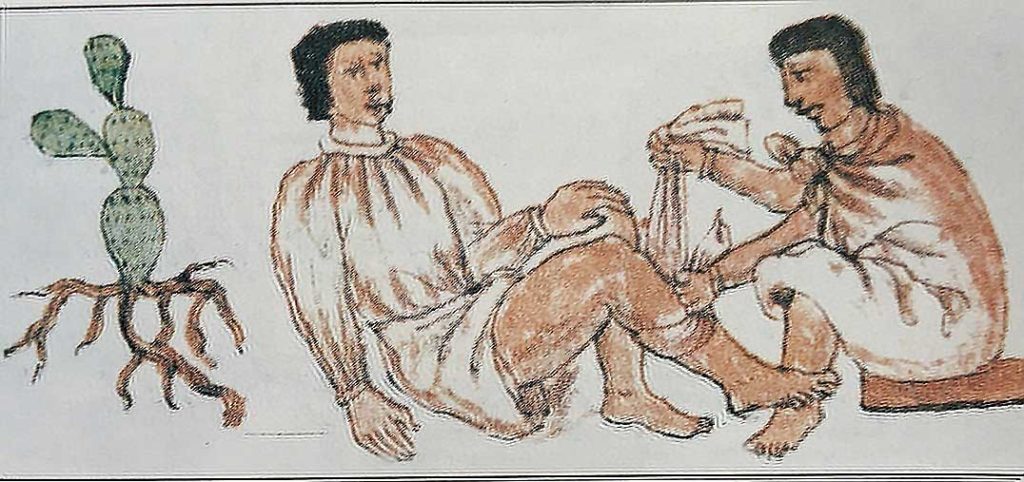
Photograph by Marco Antonio Pacheco. In Mexican Archeology, July-August 2005
The best service that a doctor can provide to a patient is to be a kind, attentive, loving and sensitive person.
Elisabeth Kübler-Ross
Medicine is one of the most complex professions because the disease that is inherent to humanity is also one of its greatest concerns, and the need to solve the ailments that periodically afflict it, is assumed by special people, and without time to lose, they try to solve ailments and face death day by day.
The various specialists in the area of medicine are in charge of diagnosing and treating multiple pathologies and diseases with the intention of improving the health, as well as the quality of life of their patients. Their work is supported by the nursing staff and the areas related to medical science that generate knowledge about diseases, treatments, therapies, and vaccination. On a daily basis and with little rest, they strive to give people the best in order to regain health and well-being.
At the end of their studies, these professionals take the Hippocratic oath, attributed to the Greek physician Hippocrates, considered the father of active medicine during the 5th century, ANE. It is a text many times translated and updated, with a great variety of topics that influenced the thinking of Western medicine for centuries. In essence, it is guidance on how those who practice medicine should behave.
There is a celebration during the first week of December called International Doctor’s Day that goes back to the tribute paid to the Cuban doctor Carlos Finlay Barrés, who in 1946 presented work on the spread of Yellow Fever caused by the Aedes Aegypti mosquito. A highly contagious and deadly disease that afflicted many nations on the American continent, especially in countries with a tropical climate, and presented epidemic outbreaks throughout the year.
The Pan American Medical Confederation, the predecessor of the current Pan American Health Organization, PAHO, and the World Health Organization, WHO recognized Dr. Finlay, because with his discovery a vaccine was created that would help thousands of people around the world. It was established in 1953, the Pan-American Doctor’s Day, and December 3, as it was the eminent doctor’s birthday. Years later it remained as International Doctor’s Day and it is a tribute to all medical professionals who day by day strive to provide care to the world’s population.
It is interesting that this celebration had its origin with the need to defeat an epidemic, something that has been constant throughout history and in 2021, health professionals around the world face one of the largest pandemics ever. news and have risked their own lives with it.
In the first year of the COVID-19 outbreak alone, with or without funeral services, more than 4,000 medical professionals in the United States left the world and today it is known that more than 5% of all deaths from the pandemic correspond to the medical personnel, which includes people who perform cleaning work in hospitals and funeral services also infected.
It has been a tragedy to learn how health resources have been insufficient to meet an unlimited demand of patients, in a way as evident and dramatic as the lack of safety equipment, adequate face masks, the lack of beds in intensive care units, and the lack of respirators. These difficulties are added to the concern about which patients should be treated with priority in this and many other conditions.
In the many battles that medicine has had to face, a very ancient one has been the fight for equal rights. In the United States, 57% of specialists in OB / GYN and dentistry are women, in the other 42 medical specialties or in leadership positions, they are less than a third. Other aspects of inequality are visible in wages, labor inflexibility, combining work with motherhood, and taking care of themselves in times of great risk such as the one we currently experience.
These aspects should call our attention to recognize that important women doctors or auxiliary specialties to medicine have contributed in a fundamental way to global health.
Suffice it to recall the first female physician in the United States, Elizabeth Blackwell, born in England, immigrated to New York in 1832. A brilliant and independent woman, whose father provided the same educational opportunities as her male siblings. With great effort, she entered medical school as the only woman and the best in her class. In the male-dominated hospital environment, she was denied access, and together with her sister Emily, also a doctor, they founded a clinic to care for indigent people and an OB / GYN for very poor women. His philosophy was to prevent rather than cure. Her interest was in influencing public health policies so that more and more women were entering the medical profession.
Today, without a cure for COVID-19, our only defense is vaccination and for this, we must recognize Katalin Karikó, a Hungarian migrant of humble origin, who became a brilliant epidemiologist in the United States and has created RNA vaccines of the Moderna and BioNTech brands. Or the eminent Sarah Gilbert, a scientist who created the AstraZeneca vaccine, who combined with immense efforts throughout her life, the motherhood of triplets and work, without enough salary to pay for childcare while spending endless hours on her research.
At Del Pueblo Funeral Home, we want to recognize the work of all health professionals who, as well as our veterans, are seen as heroes and heroines of society. They work endless and stressful hours, they sacrifice their health, their personal life, and their mental health affects them too. In these moments where the world is going through a terrible health crisis, its effort to save lives is exalted. We celebrate International Doctor’s Day this and every day, for the great value of these professionals around the world and their vocation of service. We also remind you that we make the most difficult moments easy.
